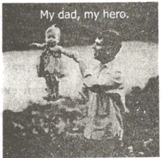题型:阅读理解 题类:常考题 难易度:普通
辽宁省凌源市2017-2018学年高一上学期英语期末(1月)考试试卷
My dad is the kind of parent that expects my best. He would never be angry if I failed at something as long as I tired. He never changes his mind after he makes it, which sometimes makes him seem too stubborn. My dad's strictness comes from the way he was raised. He grew up working long hours on his family farm. His dad was bad-tempered, and he would get angry enough to throw wooden boards at my dad when he did something wrong. In high school, my dad woke up at four in the morning to get his chores(家务杂事)done and walk to school so that he would make it to basketball practice by five.

Through all of the duties my dad had at home, he played three sports and went to school on top of it. school would have been easy, but my dad had dyslexia(读写困难)which made it nearly impossible for him to read. Since dyslexia wasn't recognized back then, every teacher my dad had passed along thinking that he was just unable to learn. My dad struggled in school until one teacher took the time to sit down and teach him how to read and write.
The best part about my dad is his attitude toward daily life. even though he likes things once right, he also knows how go to with the flow and have a good time. My dad doesn't worry about things he can't control. When he comes home from a terrible day at work, he always puts on a smile on his face because he knows family is a lot more important than any other tings.
I know that I get my best qualities from my parents and the way they raised me. My dad has shown me that with discipline and hard work I can achieve anything, and have fun while doing it.
试题篮